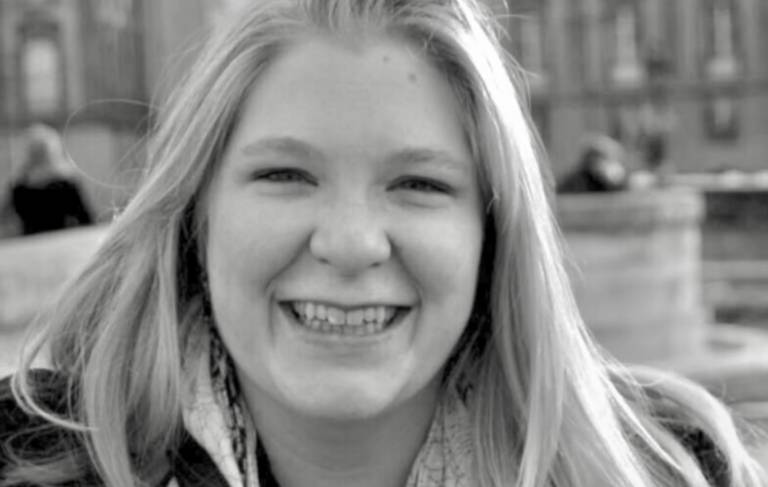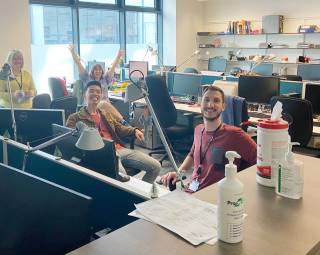Meet The Staff: Lee Darwent
3 May 2022
This is the third in a new series of articles where we interview members of staff at the MRC Prion Unit at UCL.

Job title: Senior Research Technician.
By Lauren Woolley, PhD Student and Co-coordinator for Public Engagement.
For the newest addition to our series of staff profiles, I interviewed Lee Darwent. Lee works in the Human Genetics Group (Programme 1) led by Simon Mead at the MRC Prion Unit at UCL, and her role spans both the research and clinical aspects of the group. Having grown up and studied in South Africa, she moved to the UK in 2012 bringing with her some varied and interesting expertise in genetics.
Lauren: What do you do in your role as senior research technician?
Lee: My job spans both the research and clinical teams, so I have a lot of different tasks. I process the patient blood samples that come in from the clinic, including making sure they are stored correctly and safely and coordinate all the samples for our research. Sometimes I also assist with diagnostics for patients at the clinic. This involves looking at the DNA from the patient blood samples to see if they have a genetic mutation which causes a prion disease. Additionally, I work as the Lab Manager for the group, so I manage the finances, taking care of things like equipment and consumables that the group needs to do their experiments.
Lauren: Some of those tasks sound very technical. Do you have any specialist experience or training that you use to do your job?
Lee: I have lots of experience extracting the DNA from ‘strange’ sources which helps me be confident when I do DNA extractions from the patient blood samples.
Lauren: Interesting. Can you tell me what you mean by ‘strange’ sources of DNA?
Lee: When I worked in South Africa I was part of the team that developed a method for collecting DNA from Rhino horn and other animal sample types. We were part of the forensic team that investigated rhino poaching in South Africa and set up the DNA profile system called Rhodis.
Lauren: That sounds very exciting! Did you need to study at university to do that job?
Lee: Yes, I studied an MSc in Genetics and Animal science at the University of Pretoria in South Africa.
Lauren: Since you did a Masters in Genetics, you must find it very interesting! Can you tell us a bit about why you enjoy it?
Lee: Sure. I like genetics because it’s like a puzzle that you have to look at and try to understand. I really like solving problems and puzzles. When I got to university and learnt more about genetics it was so exciting. The best part for me is seeing the cause and effect of some genetic mutations - when it goes wrong in one spot, and you can see the impact that has in the animal (or person).
Lauren: So how did you go from investigating rhino horn DNA in South Africa to working at the MRC Prion Unit at UCL? It feels like a big jump!
Lee: I was working as a research assistant in South Africa, so when I decided I wanted to move to the UK I applied for similar positions here. I have always been interested in neuroscience so I took a role at the UCL Institute of Neurology (ION). I did briefly work as a sales associate for Merck after that, but I realized once I left ION that I really love being a research technician so I came back as soon as I could. I saw the opportunity at the MRC Prion Unit at UCL to work within the genetics team which seemed like the perfect fit for me; it combined my passion for genetics with my positive experience working in neuroscience. I’ve been here for about three years now!
Lauren: Do you have a most memorable work day from your time here at the Unit?
Lee: Definitely the first day that the whole team was back in after Covid restrictions were beginning to lift. I still worked through most of the Covid lockdowns as a key worker, but the majority of people were working from home so it was really nice to have everyone back. I wouldn’t say it was our most productive day in the office, but it was so lovely to have the whole team back together again.

Lee: The Prion Unit is a very collaborative, friendly place and this is so important to me at a place I work. As someone who isn’t from here, I love working somewhere where people come from such a diverse range of countries and different cultures. Pre-covid, we started a Wednesday lunch club where one person would cook a meal from their country of origin for the whole group so we could try different cuisines. We had lots of different ones including Greek, Malaysian, and Italian. I made a classic South African spiced mince dish called Bobotie.
Lauren: I wish I had been there to try that. Can you tell us what you think you would be doing now if you weren’t a research technician?
Lee: I was originally training to be a vet for two years and then discovered genetics along the way, so maybe something with animals. Although, I am known as the Christmas Queen here; I make sure that the office is decorated to the nines every year and carols are playing in the labs from November onwards. If there was a way to make Christmas my full-time job I think I would do that!
Lauren: Sounds festive! Since you started training to be a vet I assume you like animals, so do you have any pets?
Lee: Not currently. I have had many through my life, including a Pug named Pug and a bird named Rhino.
Lauren: Some interesting names there Lee! It’s great to hear how much you enjoy being a research technician. To finish off, is there anything you want people to know about it as a job?
Lee: I think it’s important to remember that you don’t have to study for a doctorate to be a good scientist and do scientific research as your full time job. Sometimes people believe that technicians have failed because they didn’t want to do a PhD or a postdoc. But actually, I love being a technician, all my technician friends love their jobs, and it is a good career. And we work hard. It’s not the ‘typical’ route you are presented as a science undergraduate, so people don’t always realise being a technician is a rewarding career path you can take.
Thank you to Lee for sharing her experiences in her scientific career so far! From investigating animal poaching in South Africa to prion diseases in the UK, this is a wonderful example of the variety of circumstances and life experiences which can lead to working here at the MRC Prion Unit at UCL. There is no one route into a job in science, and such a broad range of opportunities to explore along the way! We hope you’re enjoying this series as much as we are, and look forward to sharing more stories from our invaluable staff in the coming months.
 Close
Close

